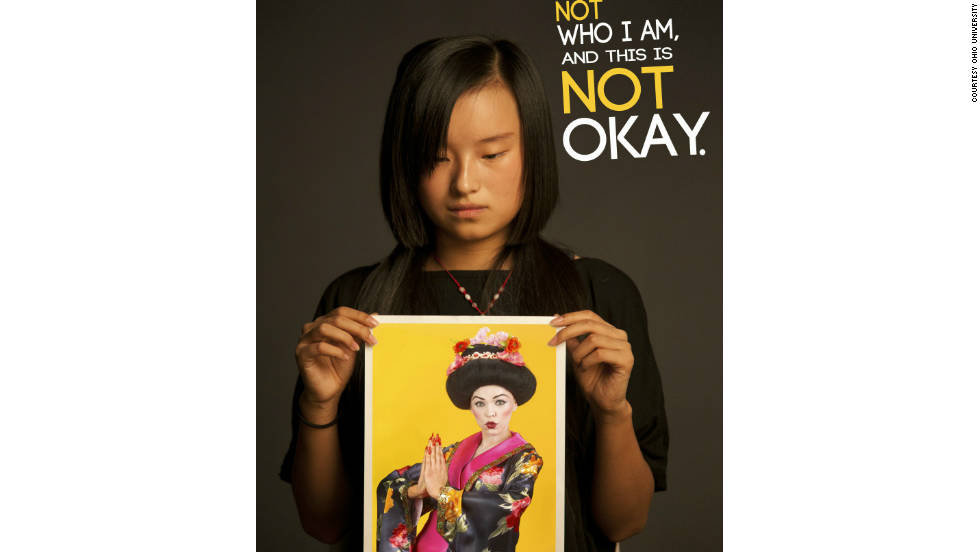Story highlights
- Ohio University students take stand against dressing up as racial stereotypes for Halloween
- "The best way to get rid of stereotypes and racism is to have a discussion," one says
- Dean supports campaign, calling it a "clean, succinct" way of delivering message
- Online response mixed, with some saying the message takes itself too seriously
Thinking about donning a kimono to dress like a geisha for Halloween, or a Mexican mariachi suit?
Students from Ohio University have a message for you: "We're a culture, not a costume."
With ethnic and racial stereotypes becoming increasingly popular Halloween costume themes, members of the school's Students Teaching About Racism in Society are launching a campaign to make revelers think twice before reducing a culture to a caricature, the group's president said.
Posters from the campaign are expected to go up on the Athens, Ohio, campus Wednesday. Meanwhile, the images are making the rounds online, raising debate over whether it's ever OK for people to paint their faces black, impersonate a racial stereotype for fun, and where to drawn the line.
It's a seasonal point of controversy, but even after widely publicized controversies such as the "Ghetto Fab" wig at Kohl's and Target's illegal alien jumpsuit, costumes of stereotypes abound. On Google's shopping section, several pages of "Mexican costume ideas" are available, from "Mexican donkey costumes" to sexy serapes and tequila shooter girls.
The ad campaign from Ohio University show students holding photos of different racial and ethnic stereotypes in costume: an Hispanic guy with a picture of the Mexican donkey costume, an Asian girl with an image of a Geisha, a Muslim student with a photo of a white guy wearing a traditional ghutra and iqal over his head, bombs strapped to his chest.
"During Halloween, we see offensive costumes. We don't like it, we don't appreciate it. We wanted to do a campaign about it saying, 'Hey, think about this. It's offensive,'" said senior Sarah Williams, president of STARS.
"The best way to get rid of stereotypes and racism is to have a discussion and raise awareness, which is what we want to do with this campaign," said Williams, who is black and plans on dressing as singer Janelle Monae for Halloween.
The most obvious offense occurs when someone who's not black decides to go blackface, because of the historical context, she said. But the message applies to all races and stereotypes -- and not just during Halloween.
The dean of students fully supported the campaign, calling it a "clean, succinct" way of delivering an important message.
"We've always tried to get a handle on what it means to be thoughtful and appropriate when it comes to talking to students about choosing costumes and making the best decisions for celebrating Halloween," Ryan Lombardi said.
"I think it's a clean way of raising awareness of how the costumes you choose might be offensive. In many cases, students aren't doing it maliciously, but they might not realize the consequences of their actions on others."
The campaign has gone viral, landing on blogs and other schools' online publications. So far, the response in the editorial sections has been positive. But in the comment sections, not everyone thinks it's a message that needs to be reinforced.
"Suddenly, I am overcome with the urge to dress up as the Frito Bandito this year," one comment on the Arizona Daily Wildcat's piece on the campaign said. "Guys & girls -- Halloween is just bit of fun. Dead guys don't come back to life and eat people. There are no hot blonde lady cops in tiny uniforms that demand to 'frisk' you. Kimonos are OK even if 'Asians' don't wear them on a daily basis."
But others think it's a message that needs to be repeated.
"I think it's almost impossible to be ironic while being racist, so irony is lost," said Jelani Cobb, a professor of Africana studies at Rutgers University and the author of "The Substance of Hope: Barack Obama and the Paradox of Progress."
"To treat a character like Batman or Superman as a Halloween costume is one thing, but to treat an entire ethnicity as a costume is something else. It suggests that people conflate the actual broad diversity of a culture with caricatures and characters."
While Italian-Americans can be stereotyped as gangsters and Irish-Americans as hard drinkers, there are no pervasive stereotypes for whites on the same level that allow for them to be caricatured as a Halloween costume, Cobb said.
"The more we look at people as caricatures, the harder it is to operate as democracy," he said. "What underlies this kind of costuming is the belief that these people aren't quite equal to what we are or aren't as American as we are, or that you as a person who's not a member of that group should be able to dictate how painful the stereotype should be."













